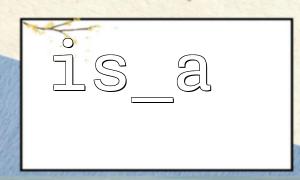In PHP, the is_a function is used to determine whether an object is an instance of a class or its subclass. It is very suitable for type detection. But if you want to write a more flexible and extensible type judge, you can combine closures (anonymous functions) to implement dynamic judgment logic, thereby avoiding writing a bunch of duplicate if or switch statements.
Let's take a step-by-step look at how to write a flexible type judge using the is_a function combined with the closure.
<?php
class Animal {}
class Dog extends Animal {}
$dog = new Dog();
var_dump(is_a($dog, 'Dog')); // bool(true)
var_dump(is_a($dog, 'Animal')); // bool(true)
var_dump(is_a($dog, 'Cat')); // bool(false)
?>
is_a can determine whether an object is an instance of a certain class or its subclass, which provides the basis for us to judge type.
We can use closures to define different judgment rules and then call them with a unified interface.
<?php
$typeCheckers = [
'dog' => function($obj) {
return is_a($obj, 'Dog');
},
'animal' => function($obj) {
return is_a($obj, 'Animal');
},
'string' => function($obj) {
return is_string($obj);
}
];
// Example of usage
function checkType($obj, $type, $checkers) {
if (!isset($checkers[$type])) {
throw new InvalidArgumentException("Unknown type: $type");
}
return $checkers[$type]($obj);
}
$dog = new Dog();
var_dump(checkType($dog, 'dog', $typeCheckers)); // bool(true)
var_dump(checkType($dog, 'animal', $typeCheckers)); // bool(true)
var_dump(checkType("hello", 'string', $typeCheckers));// bool(true)
?>
In this way, adding new type judgment only requires adding a closure to the $typeCheckers array, greatly improving the flexibility of the code.
Sometimes we need to dynamically create a judge based on the class name, and we can write a function to help us quickly generate closures:
<?php
function makeIsATypeChecker(string $className) {
return function($obj) use ($className) {
return is_a($obj, $className);
};
}
$typeCheckers['cat'] = makeIsATypeChecker('Cat');
// test
class Cat extends Animal {}
$cat = new Cat();
var_dump(checkType($cat, 'cat', $typeCheckers)); // bool(true)
?>
This makes our type judge system more versatile and easy to maintain.
Sometimes we need to determine whether the object implements a certain interface or inherits a certain parent class, and we can write a more general judge:
<?php
function makeClassOrInterfaceChecker(string $name) {
return function($obj) use ($name) {
return is_a($obj, $name) || in_array($name, class_implements($obj));
};
}
interface Pet {}
class Dog extends Animal implements Pet {}
$typeCheckers['pet'] = makeClassOrInterfaceChecker('Pet');
$dog = new Dog();
var_dump(checkType($dog, 'pet', $typeCheckers)); // bool(true)
?>
In this way, it is very flexible to judge both the inheritance relationship and the interface implementation.
<?php
class Animal {}
class Dog extends Animal {}
class Cat extends Animal {}
interface Pet {}
class DogPet extends Dog implements Pet {}
function checkType($obj, $type, $checkers) {
if (!isset($checkers[$type])) {
throw new InvalidArgumentException("Unknown type: $type");
}
return $checkers[$type]($obj);
}
function makeIsATypeChecker(string $className) {
return function($obj) use ($className) {
return is_a($obj, $className);
};
}
function makeClassOrInterfaceChecker(string $name) {
return function($obj) use ($name) {
return is_a($obj, $name) || in_array($name, class_implements($obj));
};
}
$typeCheckers = [
'dog' => makeIsATypeChecker('Dog'),
'animal' => makeIsATypeChecker('Animal'),
'pet' => makeClassOrInterfaceChecker('Pet'),
'string' => function($obj) { return is_string($obj); },
];
// test
$dog = new Dog();
$cat = new Cat();
$dogPet = new DogPet();
var_dump(checkType($dog, 'dog', $typeCheckers)); // true
var_dump(checkType($cat, 'animal', $typeCheckers)); // true
var_dump(checkType($dogPet, 'pet', $typeCheckers)); // true
var_dump(checkType("hello", 'string', $typeCheckers));// true
?>
In this way, you can easily build a flexible and scalable type judge for a variety of complex business needs.














